Boolean search for social media monitoring: What to track, how to track, and why
Boolean search is a type of search that combines terms with operators and is used in social listening tools and search engines. Boolean operators decoded.
Boolean search is a type of search that combines terms with operators and is used in social listening tools and search engines. Boolean operators decoded.
If you have any experience with social media monitoring platforms, you know that getting precise results may be tricky at times: Apps can show a lot of noise for brands with common names or, quite the contrary, miss some valuable data behind due to the restrictive filters. That’s when Boolean search fits in perfectly.
In a broad sense, a Boolean search is a type of search that combines terms with operators. It’s used in social listening tools, search engines, and other apps. It lets you find precisely what you’re searching for, and exclude what you’re not. I have to mention that not all social listening tools provide Boolean capabilities, but some platforms such as Awario, SproutSocial, or Google Alerts do let you test it before starting your subscription. Dealing with those Boolean queries may look intimidating at first if you aren’t familiar with programming. But the good news is that first of all, not everyone needs Boolean: If you’re monitoring unique keywords, you’ll be alright with a regular search mode. And secondly, mastering the basics of creating Boolean queries doesn’t require any technical background at all.
Before creating your first query, you should get comfortable with major Boolean operators, such as “AND”, “OR”, “AND NOT” (which is sometimes used as “NOT” or just “-”).
This one narrows your search to find results of both keywords or groups of keywords within one post, so the query like “Prince William” AND “Duchess Kate” will show us results where both names are mentioned: 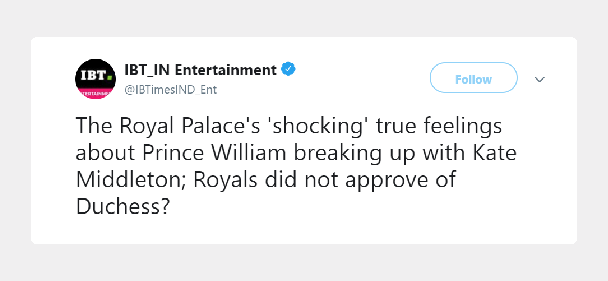
OR broadens the search to find results where any term is mentioned. This can be good for misspellings, typos, and alternatives of the same term. For example “Catherine, Duchess of Cambridge” OR “Duchess Kate” will show mentions with any version of her name: 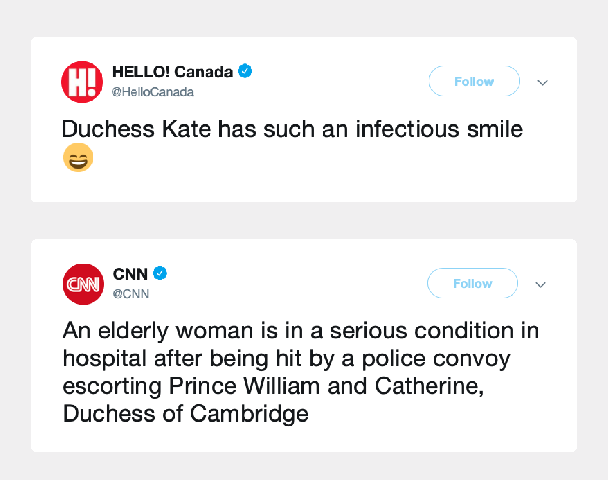
AND NOT lets you exclude terms you don’t want to appear in your search results. If you don’t want to get mentions about Prince William’s 37th birthday, (“Prince William” AND NOT birthday) will help you get relevant mentions: 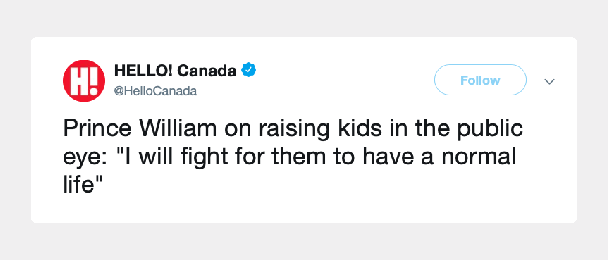 The list of Boolean operators and their logic varies on different tools: some of them, such as Google Alerts, has a pretty basic set (which is enough in most cases though) which includes “OR”, “-”, “site”, quotation marks, and an asterisk. Others, like Brandwatch, offer advanced operators, such as “NEAR/n”, “raw”, “country”, and more.
The list of Boolean operators and their logic varies on different tools: some of them, such as Google Alerts, has a pretty basic set (which is enough in most cases though) which includes “OR”, “-”, “site”, quotation marks, and an asterisk. Others, like Brandwatch, offer advanced operators, such as “NEAR/n”, “raw”, “country”, and more.
Boolean search is applicable in multiple scenarios, but I’d love to focus more on the cases where this mode is indispensable. So below you can find the cases when a few lines of code can save you tons of time on cutting through the noise.
This is a time-saving tactic that lets you create a query using just a few lines of code instead of entering all possible brand name alternatives. Works best for three-word names or more. Let’s say there’s a brand that’s called C.S. Johnson & Sons. This brand name can be spelled in a number of ways: 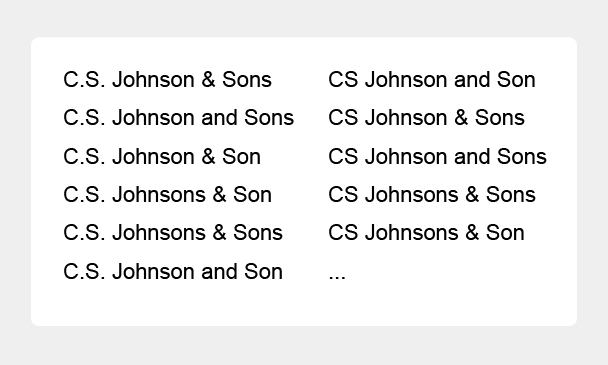 But if you have access to Boolean search, you can create the following query:
But if you have access to Boolean search, you can create the following query: 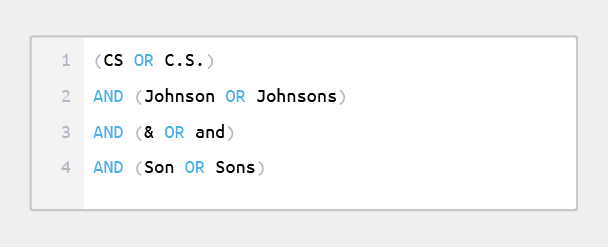
As in the previous case, you can apply the power of grouping words for searching brands with common or ambiguous names. And there are two ways of treating those cases. First of all, you can exclude irrelevant results by adding a group of negative keywords, which are terms you don’t want to be used in your results: 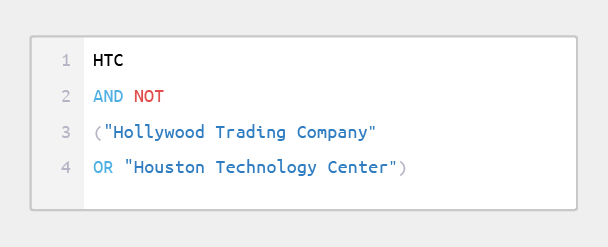 Secondly, you can add some terms to be used with the brand name to ensure you find results that matter to your business.
Secondly, you can add some terms to be used with the brand name to ensure you find results that matter to your business. 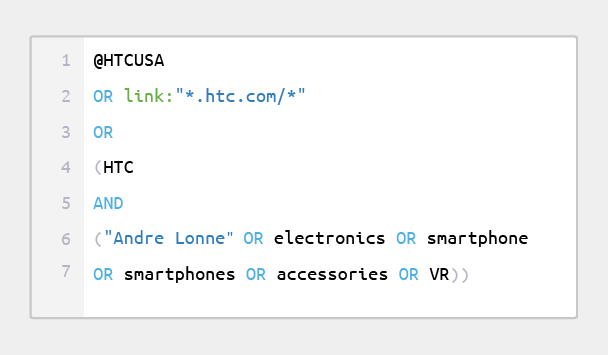 On the screenshot above, at the top, you can find a social media handle and a website that will bring relevant results per se. They’re followed by the brand name that can be used in multiple cases, but we narrow it down to the relevant case only. And finally, sometimes it makes perfect sense to use both “AND” and “AND NOT” operators:
On the screenshot above, at the top, you can find a social media handle and a website that will bring relevant results per se. They’re followed by the brand name that can be used in multiple cases, but we narrow it down to the relevant case only. And finally, sometimes it makes perfect sense to use both “AND” and “AND NOT” operators: 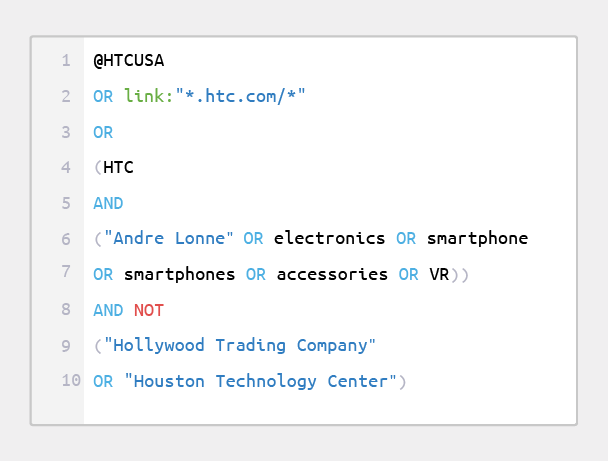 This query shows only relevant results since the whole query is supported by negative terms.
This query shows only relevant results since the whole query is supported by negative terms.
Boolean search lets you easily create queries that contain only mentions of a particular brand or industry and don’t have links to this brand. It works best for news articles and other web pages, so note that you’ll need a tool that monitors those sources as well:
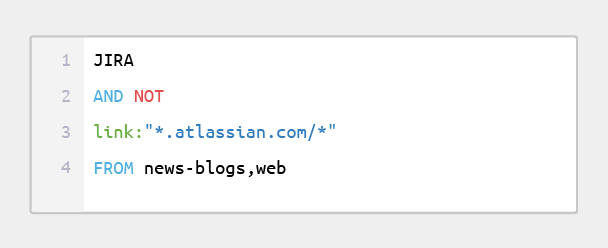
This query will deliver all webpages that mention JIRA on the web and don’t have links to their website. So our job here is to reach out to website owners to turn those pages into backlinks.
This technique is useful for international companies. You can set up an alert that will deliver relevant mentions to a person in charge of the company unit from a particular geographical area. You can use the country operator to limit the search to a specific location that’s provided by social networks. And in addition to that, you can create another group of keywords that will provide search results for your keywords with location names. This way, the tool will cover mentions where people use the names of relevant locations in the text of a post. 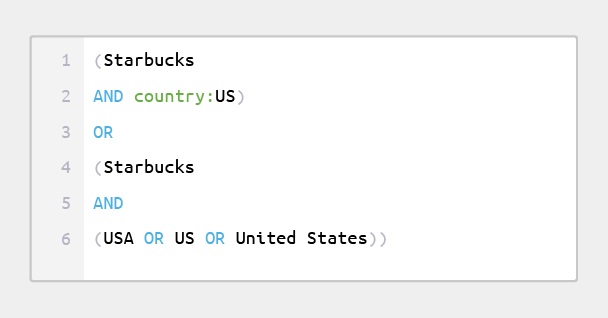 The example above searches for mentions posted in the US as well as all the mentions where location keywords are used within a post.
The example above searches for mentions posted in the US as well as all the mentions where location keywords are used within a post.
This one is great for crisis managers in a company. Boolean search lets you create queries that search for posts containing problematic terms. To use this, you’ll need the proximity operator near/n that will let you specify the maximum distance between the name of a company and a word or phrase typically used to complain about something online: 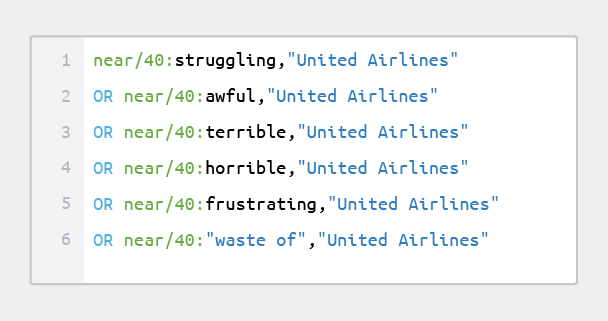
The other case where Boolean search comes in handy is lead generation. To set up a search, you’ll need to come up with a few phrases that people typically use to ask about services online, such as “I’m looking for”, “I need”, “recommend me”, and similar search queries. By using the near/n proximity operator, you can define the distance of those phrases from your target keywords: 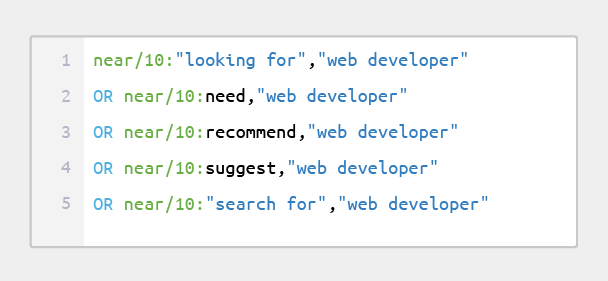 This query will monitor social platforms for all new posts where people search for web designers. All you need to do is interact with those posts internally from the tool (if it has the capability to do so) or externally from a social media platform.
This query will monitor social platforms for all new posts where people search for web designers. All you need to do is interact with those posts internally from the tool (if it has the capability to do so) or externally from a social media platform.
And the last one I’d like to tell you about is checking texts for copyright infringement. All you need to do is add a few pieces of content to the alert (don’t forget to quote it to search for the exact match). 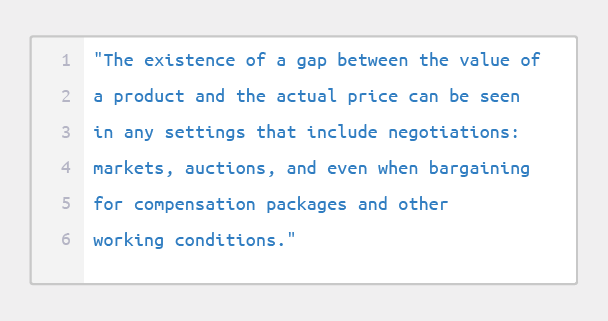 The app will search for matches of those pieces on social media platforms and the web and notify you each time someone’s taking advantage of your work without permission.
The app will search for matches of those pieces on social media platforms and the web and notify you each time someone’s taking advantage of your work without permission.
Using Boolean for social media monitoring is a great way to cut through countless mentions to find those gems that let you understand your audience better and reach your social media marketing goals. So when you shop for a social media monitoring tool, make sure it’s equipped with a Boolean search mode.